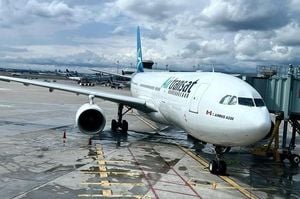Facing significant financial losses due to dwindling mail volumes, PostNL has formally requested €68 million from the Dutch government to sustain its universal postal services. The company's plea highlights the urgent need to address the challenges shaking its operations amid changing consumer habits.
PostNL's official request was swiftly met with skepticism, as the Ministry of Economic Affairs rejected the bid, underscoring the importance of current investigations concerning the future of the postal market. According to the ministry, no irreversible decisions will be made until comprehensive analyses are completed.
Over the past decade, mail volumes handled by PostNL have almost halved, leading to increasingly unprofitable operations. According to Maurice Unck, the director of MailNL at PostNL, the shift from traditional postal services began disturbing their business model significantly. "We’ve been adapting for years, but we've reached the limit of what we can do alone," he explained.
The company is grappling with rising operational costs, as obligations to deliver mail quickly and efficiently remain stringent, dictated by existing regulations. PostNL has long sought adjustments to the laws governing postal delivery timelines, proposing more flexibility—such as allowing delivery over two or three days instead of the current day-after requirement. This proposal has met with resistance, particularly from the Dutch Parliament.
Last year, Minister Dirk Beljaarts indicated resistance to altering these delivery obligations, asserting, "It is unacceptable to take irreversible steps before the studies are complete," marking the government’s cautious approach to significant changes within the postal sector.
The need for financial assistance is particularly acute, as Unck noted, "We see profitability decreasing. If we do not act now, we will continue to operate at a loss. This request is based on legal grounds for our role as the universal postal service provider." This acknowledgment of losses links back to changing societal habits, with fewer letters being sent and received.
Despite operating at a loss for postal services, PostNL reports continued profitability within its package division, which has been buoyed by the rise of online shopping and parcel deliveries. Yet, the postal division’s losses still necessitate immediate government action to prevent service failures.
The company's proposal for assistance includes €30 million earmarked for 2025 and another €38 million for 2026. This funding would be directed at maintaining current postal services until revised laws could be established. While Unck clarified, "This is not about state aid—instead, we are seeking fair compensation for our legal obligations," the government nonetheless remains skeptical.
The Ministry of Economic Affairs responded quickly after PostNL's announcement, indicating they are not currently considering the request for immediate financial support. "Temporary or definitive measures, such as government assistance, are not on the table right now," it stated through the ANP news agency shortly after PostNL made its plea.
PostNL has proactively implemented measures to manage costs, including reducing the number of postal pickups at less-utilized mailboxes and eliminating same-day delivery for certain types of bulk mail, reflecting the company's attempt to streamline services amid operational challenges.
Despite the adjustment efforts, the recent announcement from the ministry was met with surprise by PostNL executives, who were hopeful for at least continued discussions. "It was unexpected for the ministry to react so quickly," Unck remarked, pointing out their detailed request had been submitted less than 24 hours prior.
Looking forward, the urgency of this issue cannot be overstated. PostNL emphasizes the necessity of adapting the Postwet— the law governing postal services—soon to prevent irreversible damage to their postal operations. Unck noted, "We are reaching the point of no return, especially since 2025 is around the corner. The declining mail volumes are no longer manageable under the existing legislative framework."
Some observers have suggested the swift denial of financial assistance signals broader apprehension within the government about the sustainability of the postal service amid shifting market dynamics. Unless legislative changes allow for more cost-effective operations and extended delivery timelines, the future of PostNL remains uncertain.
Although Unck remains hopeful the government will reevaluate its stance, he acknowledges, "If our funding request is denied and no changes to the universal service obligation occur, we might face severe challenges moving forward."
With significant discussions pending and financial uncertainties looming, the fate of the postal service holds broader implications for consumers and the delivery infrastructure across the Netherlands. How the government responds to PostNL’s challenges will shape not only the company’s future but also the access consumers have to postal services.



